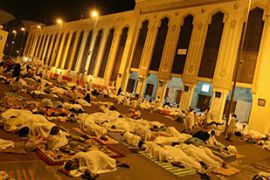Pilgrims perform key Hajj rite
Millions of Muslims gather at Arafat, the scene of Prophet Muhammad’s final sermon.

Many took shelter under bridges, tarpaulins or whatever they could find, and when the rains abated in the afternoon, Saudi authorities reportedly handed out dry ihram clothes – the two pieces of unstitched white cloth that male pilgrims wear.
Flu fears
On Thursday, pilgrims will spend the day at Arafat in reverent prayer, often calling out the chant: “Here I am in answer to Thy call, Lord, here I am. There is no other God but Thee. Praise be unto Thee.”
| special report | |
|
Hajj got off to a soggy start on Wednesday morning, when heavy rains drenched pilgrims arriving at Mina’s campgrounds from Mecca and surrounding areas.
Mount Arafat, at the centre of the plains, was the scene of the Prophet Muhammad’s final sermon.
The day of Arafat is considered one of the most sacred days of the Islamic lunar calendar and many Muslims not performing Hajj choose to mark it by fasting.
The wet weather has heightened fears of a possible outbreak of H1N1 flu during Hajj.
Those concerns dominated headlines in the weeks and months before Hajj, as pilgrims arrived in droves from around 160 different countries.
‘Under control’
Abullah al-Rabeaah, Saudi’s health minster, sought to play down those concerns on Wednesday, saying all possible precautions had been taken.
“The status is reassuring, our assessment shows that H1N1 is under control,” al-Rabeaah told Al Jazeera.
He said that 67 pilgrims have been diagnosed with H1N1 flu. All of them have been given medical treatment, but four cases remain in intensive care.
At least four pilgrims have already died of H1N1 flu.
On Friday, pilgrims will return to Mina, after stopping the night at Muzdalifah, to carry out another ritual where pilgrims hurl stones at one of three walls called jamarat, symbolising the stoning of the devil.
Hajj is one of the five pillars of Islam and it is mandatory for all able-bodied Muslims with the financial means to undertake it once in their lifetimes.
